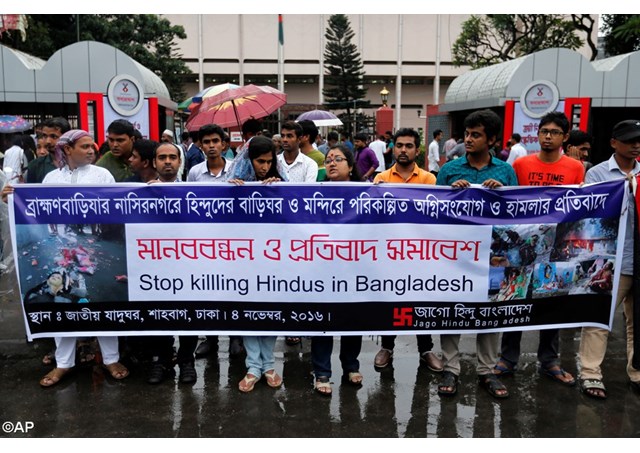
Evicted tribal people face food crisis in Bangladesh

Indigenous Santal people, who were violently evicted from their ancestral lands by a sugar plantation and mill in the northern Gaibandha district of Bangladesh, are now facing a food crisis.
About 2,500 Santal squatters, mostly Christians, were forced off disputed land in the Sahebganj area by workers from the Rangpur Sugar Mill with support from the local administration and police on Nov. 6-7.
On that day, local Christians, mostly ethnic Santal Catholic, clashed with the police because of a land dispute. Witnesses noted that police had arrest warrants for 300 Santal, who fled to avoid jail. Others defended themselves with bows and arrows injuring some agents.
Three Santal men were killed and dozens injured when they tried to resist eviction by "local thugs" who were sent by the mill with the approval of local parliamentarian, Abul Kalam Azad. The attackers also looted the homes and livestock of tribal people and set fire to about 600 squatter homes.
Evicted families have taken shelter under the open sky in three neighboring villages while police continue to prohibit them from moving causing a food crisis.
"We can't walk out of the village to find work. We have no food and no money, so we have been starving since the eviction on Sunday night," Emmanuel Baskey, a father of three, told ucanews.com.
Baskey said that nuns from the Missionaries of Charity handed out food and clothes to 200 people on Nov. 9. "We are trying to survive on a few kilograms of rice, oil, lentils and few scraps of clothing," Baskey said, adding that the eviction has thrown his five-member family into dire straits.
"Besides burning my house, the attackers have looted my cows, goats, power tiller and water irrigation pump. I don't know how to recover from the great loss," he said.
For human rights activist Jotirmoy Borua, this "was premeditated…. We received information that local police and Muslims attacked Tribals to take away their land," he said.
Church groups are trying to reach out and help the evicted people, said Father Samson Marandy, parish priest from Our Lady of Sorrows Catholic Church in Dinajpur, which covers the affected area.
"These people have been living in absolute fear since the attacks; they don't have food, can't get medical treatment and don't have an income," he said.
Due to the dispute's political nature, the local church has found it difficult to aid and assist the Santals, Father Marandy said.
"We have been in touch with Caritas and the nuns for support. Some of them have also taken shelter in church buildings. But we can't do anything openly because the issue is so political," he said.
On Nov. 10, hundreds of Christians, Hindus and Buddhists formed a human chain and held a protest in Dhaka to advocate for the Santal cause.
"We condemn the attacks on tribal people and call on the government to ensure justice and the realization of their rights," said Nirmol Rozario, protest organizer and president of the Bangladesh Christian Association.
Rozario said that the government must also adequately compensate families of the dead, injured and those who lost their homes.
The same day, ten Bangladeshi religious, social and human rights groups including the Catholic Church's social action agency, Caritas signed a petition and demanded a "judicial investigation."
"Earlier we appealed to the government to solve this land dispute through legalities and discussion, but it was ignored which led to deadly violence," the petition said.
The reason for the dispute lies in the fact that "After 1962, the government bought 774,000 hectares of land that belonged to the Santal, where they grow sugar cane,” the clergyman explained.
“The agreement provided that the land would be used only for this type of crop. If another crop was introduced, the land would go back to the original owners. In 2003, the local government suspended sugarcane production and so local Tribals asked for their land."
Baskey claimed that 30 tribal men are missing since the eviction.
"We don't know what happened to them. Maybe they were killed or forcibly disappeared. We are ready to die but we won't give up our movement to claim our ancestral land," Baskey added.
Subroto Kumar Sarkar, officer-in-charge of the local Govindaganj police station refuted the allegations.
"We don't have any information regarding deaths and missing persons. We have arrested only four people for attacking police during clashes," Sarkar said.
Abul Kalam Azad, the local parliamentarian, denied any involvement in the eviction and violence.
"I am not involved in any way and I have condemned the attack on tribal people as an inhumane act. My political opponents are spreading propaganda against me to tarnish my image," Azad said.
(source: UCANews; AsiaNews)
| All the contents on this site are copyrighted ©. |


